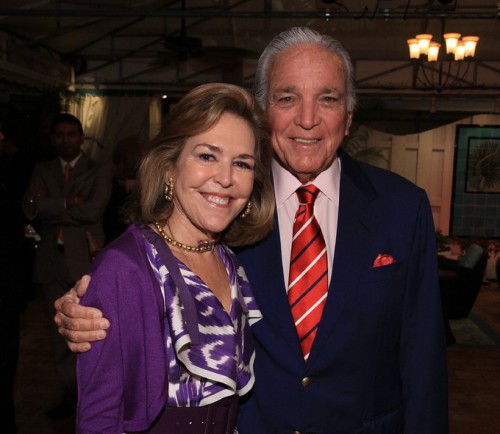Free Enterprise Without Freedom
by Orlando Luis Pardo Lazo / February 17, 2014 / No comments
Are Cuba’s economic reforms really a change for the better?

Alfonso Fanjul (right), a Cuban millionaire-in-exile, recently announced his interest in investing in Cuba, to sharp criticism. Photo: Palm Beach Centennial via Flickr.
Exiled Cuban tycoon Alfonso Fanjul traveled to Cuba a couple of times in 2012 and 2013. Recently he confessed to having a “soft spot in my heart” for Cuba and an “open mind” toward investing his fortune on the island, under the “right circumstances,” “legally,” and in the “proper framework.”

- Is it worth-while to focus on the last images and letters coming from the inside of the last living utopia on Earth? Is Cuba by now a contemporary country or just another old-fashioned delusion in the middle of Nowhere-America? A Cold-War Northtalgia maybe? Can we expect a young Rewwwolution.cu within that Ancien Régime still known as The Revolution? I would like to provoke more questions than answers.

- Orlando Luis Pardo Lazo was born in Havana City and still resides and resists there, working as a free-lance writer, photographer and blogger. He is the author of Boring Home (2009) and is the editor of the independent opinion and literary e-zine Voces.
Fanjul is just one example—he’s not the only Cuban millionaire-in-exile to have this in mind—but a scandalous public reaction quickly followed his statement, even reaching the highest levels of US politics. Florida’s senator, the Republican Marco Rubio, said that he was surprised and disappointed by Fanjul’s change of heart, as Fanjul has supported initiatives that have opposed Castroism head-on for decades.
The key question is whether Cuba’s human rights violations cause any concern at all for those whose economic interests hover over the island, whether they be foreigners or Cuban exiles. (Just for starters, the Havana government prohibits Cubans on the island from investing in their own country.)
Some people seek to invest in the dictatorship with the intention of being able to democratize it. They give their backing to Raúl Castro’s reforms, which follow the Chinese model, presumably to keep more radical policies from turning us into a Caribbean North Korea. However, in my opinion, investors are only fabricating this differentiation in order to avoid having to talk about profits and political pacts between the big former Castroist and former anti-Castroist players. In practice, Cuba already has as much of Beijing’s market voraciousness as it does of Pyongyang’s criminal despotism.
What’s surprising is that international entrepreneurs are refusing to recognize that their investments will be extremely insecure in Cuba. Many investors have ended up being accused of corruption and have had their assets confiscated. The lucky ones have been deported to their country of origin without any right to compensation. Those less fortunate have ended up in prison.
Consider John Stuart Mill’s well-known statement: “One’s own liberty ends wherever the liberty of others begins.” Where foreign deals with Castroism are concerned, this sentence could just as well be rewritten as: “One’s own liberty ends wherever they put an end to the liberty of others.” Decency must be the foundation of any law or legal reform. Amassing a profit from the humiliation of others is a feudal approach. Is that what post-revolutionary capitalism in Cuba will turn out to be?
The chief business of the Cuban people now—contrary to what President Calvin Coolidge (1923–1929) said of the United States—is not business, but rather to finally live in a free society where business is not a privilege bestowed by the state, but a right held by all citizens, on and off of the island.




